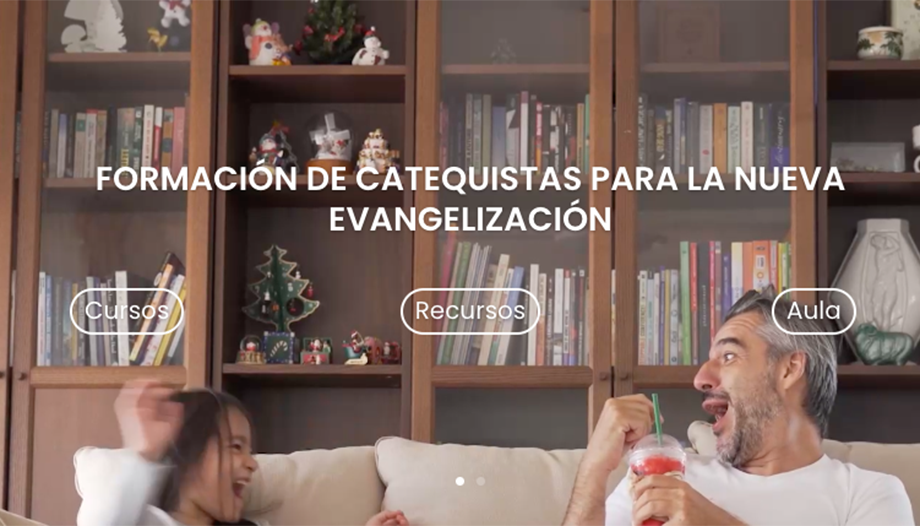To make the formation of catechists and those who have the task of transmitting the faith truly professional and complete. This is the key to #BeCaTThe project offers resources and updated didactic proposals, systematized formation and personal accompaniment to the students of its courses. All this, with the aim of contributing to the renewal of catechesis throughout the world.
"The great challenge we have in the Church is formation," says Fernando Moreno, coordinator of #BeCaT. Magisterio of the Church. Or it is unaware of those that exist, among other things, because these resources are often offered in a very scattered and unsystematic way".
A tool, not a solution
#BeCaT is, in Moreno's words, "a formation tool. It is neither an integral solution nor a substitute for the work of catechesis that is done in parishes, schools and, above all, in families".
#BeCaT offers complete, short, online courses to train catechists. These courses are adapted to the needs of each institution (diocese, parish, school, ...), which makes their development more practical.
The option for online training does not take away the need for personal support, which is another of the characteristics of this project: thanks to new technologies, training is accessible to a greater number of Spanish-speaking people, but this is combined with the support offered to those who take these courses. "We are aware that personal support is always necessary, it is very different to have this help than not to have it at all", emphasizes Fernando Moreno.
Unitary but complementary courses
The courses range from Catechesis of Christian Initiation in the family, catechesis of engaged couples and young couples, aimed at those who carry out formative activities involving young couples, engaged couples... or Quo Vadis, an interesting course designed to train critical thinking skills and reflection, based on different current issues that an educator must master. Among the subjects in the different modalities that can be chosen on this platform are, for example, family catechesis, Christian anthropology, Christology, Liturgy or Church History. All of them are taught by professors of high academic level and experts in the various subjects.
Each of the courses has a duration of one month and a very affordable price since a donation of 10€ is made with the aim of financing those people who cannot afford this money to take a course in Latin America. "No one should be left without training because they cannot afford it, even if it is very little", emphasizes the coordinator of #BeCaT.
Although each course is independent, you can take one, several or all of them, those who complete all the subjects of the study plans, that is, the 5 semesters, receive the title of University Expert in Catechetical Didactics, a degree awarded by the International University of La Rioja.
Varied and current resources
In addition to the level of formation offered in #BeCaT, another of the characteristics of this initiative is the variety and usefulness of the resources that are obtained by taking these courses. The virtual classrooms, for example, are platforms that facilitate the educational task for priests, teachers and catechists, in addition to promoting the participation of families for formation in the truths of the faith. From these classrooms it is possible to access the content of the chosen courses and choose the content to be shown in order to adapt it to the different audiences to which it is addressed. It also has a series of printed manuals and useful guides for parents and catechists that focus on the key points of each section of the course.
Particularly interesting is the wide range of audiovisual resources that deal with aspects such as the sacraments, the salvation that comes from Christ, etc., through various videos of interventions by different Popes, audiovisual formation channels such as Se buscan rebeldes or songs.
The family, the center of training
The #BeCaT project has a clear idea: the family is always the key center of a good faith formation, that is why its courses are directed in a very special way to fathers and mothers, because they have, by nature, that role of educators in the faith of their children and, in the case of the catechist courses, a very important part of the formation is directed to a meeting and joint action of the catechist with the families.
"There are tasks that the family cannot delegate because neither the school nor the parish have the transforming capacity of a family", emphasizes Fernando Moreno, "in the family environment, education is based on experiences and that is key, whether in the education of faith, temperament, character or virtues". "If in faith education we address only to children, we have wasted our time, it is a temporary patch that in the end, as we are seeing, leads to a cynical attitude", points out this professor who emphasizes that "what we are currently experiencing, this cultural crisis, is basically a crisis of faith".
Hence the importance of a project such as #BeCaT, which aims to provide this formation in a professional manner, following the Magisterium of the Church and in such a way that those who follow its courses can give solid answers to the questions of faith, morals and family life that society poses at any given moment.





 For Many - For All: Elements for Catechesis
For Many - For All: Elements for Catechesis





